|
|
|
Sort Order |
|
|
|
Items / Page
|
|
|
|
|
|
|
| Srl | Item |
| 1 |
ID:
152930
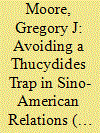

|
|
|
|
|
| Summary/Abstract |
In 2015, Harvard’s Graham Allison wrote an evocative article discussing the “Thucydides Trap” in relations between China and the United States, highlighting the danger of war between a rising power and a reigning power in the international system. Can China and the United States avoid the Thucydides Trap as China rises? This analysis identifies and analyzes seven reasons China and the US might not be able to avoid the trap: the bilateral strategic trust deficit, lack of agreement on the nature of the US pivot, recent trends in China’s maritime policies, disagreements over cyber security, security dynamics underlying China’s Anti-Access/Area Denial and Washington’s AirSea Battle strategies, recent trends in Sino-Russian strategic alignment, and Washington’s concerns about China’s increased defense spending.
|
|
|
|
|
|
|
|
|
|
|
|
|
|
|
|
| 2 |
ID:
165536
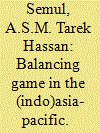

|
|
|
|
|
| Summary/Abstract |
The (re)emergence of China and the relative decline of the power of the United States (US) as the unipolar super power has shifted the geostrategic centre of gravity towards the Asia-Pacific region, also known in its extended form as Indo- Pacific region. Multiple new and frozen flashpoints have emerged in this region as China is increasingly seeking to tilt the power balance in its favour and the US is growing doubtful and impatient regarding the Chinese intentions. To mitigate the China threat, the US has already rebalanced its foreign policy under the Obama administration from the Middle East to the Pacific and current President Trump has extended the geographical reach of his new grand strategy of Free and Open Indo-Pacific to bring the Indian Ocean into play. One of the most predominant discourses that tries to explain this emerging great power relation and power transition is the ‘Thucydides Trap’. This discourse maintains a binary understanding that in a bipolar setting, the rise and decline of great powers make war inevitable. However, this oversimplified assumption may lead to a limited understanding of a region which has emerged with the support of the liberal order and slowly replacing the West as the epicentre of economic progress. This paper argues that there are ‘other discourses’ where middle and smaller regional powers not necessarily stranded between great power rivalry, rather they renegotiate the order in the (Indo)Asia-Pacific region to create multipolarity. On the contrary, the interdependence of the US and China in a globalized world compels the great powers to find ways to keep peace in the troubled waters of the Indo-Pacific. To find out to what extent all these discourses are intertwined and influence each other is another objective of this paper.
|
|
|
|
|
|
|
|
|
|
|
|
|
|
|
|
| 3 |
ID:
148941
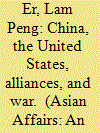

|
|
|
|
|
| Summary/Abstract |
Chinese President Xi Jinping emphatically rejects the so-called Thucydides Trap and its analogy that a rising China is destined for war with the United States, the status quo great power. But there is a contradiction between Beijing's peaceable rhetoric about a “New Type of Major Power Relations” with the US, and Beijing's disregard for the US and its allies. concerns about rising Chinese assertiveness in the East and South China Seas. It is not inconceivable that smaller Chinese and American allies in East Asia might well drag the US and China into a conflict rather than a conflict directly caused by the “power transition” between the two great powers per se.
|
|
|
|
|
|
|
|
|
|
|
|
|
|
|
|
| 4 |
ID:
174876
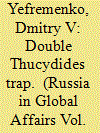

|
|
|
|
|
| Summary/Abstract |
Donald Trump’s presidency steered U.S.-China relations into a phase of open rivalry for global domination. The U.S. has failed to sidestep the risk of confrontation with China that Graham Allison warned of with his “Thucydides trap” metaphor. The two countries’ strongest trading and economic interdependence has proven unable to prevent a political standoff between Washington and Beijing. Their competition in science and engineering may result in the emergence of two technoeconomic platforms other countries will have to choose between. At the same time, the new U.S.-Chinese bipolarity is far more complex and internally controversial, which is a reason enough to postulate the existence of a “double Thucydides trap.” Importantly, global development is being greatly influenced by the interaction within the U.S.-China-Russia triangle.
|
|
|
|
|
|
|
|
|
|
|
|
|
|
|
|
| 5 |
ID:
160244
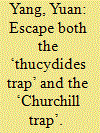

|
|
|
|
|
| Summary/Abstract |
The ‘Thucydides trap’ exaggerates the risk of war breaking out between the rising power and the ruling power in the contemporary age. The greater challenge facing China and the United States is to avoid falling into the ‘Churchill trap’. That is, falling into a long-term confrontation by repeating the mistakes of the Cold War between the US and the USSR. Both the ‘old’ history of the ancient East Asian bipolar system and the current experience of Sino-US interaction in East Asia suggest that, in addition to hegemonic war and cold war, there is a third type of great power relationship between the two poles, which I call ‘co-ruling’, whereby rather than being geographically demarcated according to their respective ‘spheres of influence’, the two superpowers jointly lead all or most of the small and medium-sized countries in the system. The theoretical and case studies examined in the article imply that the ‘co-ruling’ mode will appear and be sustained at a time when the two superpowers’ foreign functions are differentiated (i.e. each of the two poles can only meet one of the indispensable needs of small countries, and the two needs that the two poles can respectively meet are different ones), when inter-great-power war is no longer a viable strategic option. The antagonistic and geopolitical colours of the Cold War ‘divided-ruling’ mode of power politics will be less strident in the ‘co-ruling’ mode, so offering an illuminating escape from both the ‘Thucydides trap’ and the ‘Churchill trap’.
|
|
|
|
|
|
|
|
|
|
|
|
|
|
|
|
| 6 |
ID:
181687
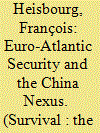

|
|
|
|
|
| Summary/Abstract |
As China has emerged over the past decade as a peer competitor of the United States, the bilateral relationship has become confrontational. Given the relatively wide range of possible strategic outcomes, Europe’s primary task is to organise itself for uncertainty. It must also assume that the US will react negatively if Europe is seen as running counter to America’s policy in the Indo-Pacific and build resilience into its policies to deal with sudden shifts in US policy. Europe’s overarching aims should be defending itself against a revisionist Russia, insulating Europe against direct Chinese coercion, helping like-minded countries prevent China from overwhelming the rules-based international order and avoiding a major war between nuclear powers. Despite the acrimony in the China–US relationship, the fear of nuclear annihilation that helped keep the Cold War cold is notably absent. Trust, especially among allies, is therefore paramount.
|
|
|
|
|
|
|
|
|
|
|
|
|
|
|
|
| 7 |
ID:
158611
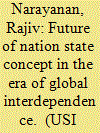

|
|
|
| 8 |
ID:
177649
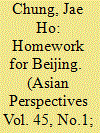

|
|
|
|
|
| Summary/Abstract |
This analysis observes that in 2020 China is a global power with global ambitions and a near-global presence. Terms
such as “G2,” “global stakeholder,” “strategic competitor,”
and “hegemonic candidate” no longer ring hollow as they
did ten years ago. However, it is unclear whether China’s
challenge to the United States will be sustainable in the medium to long run. The essay considers five hurdles in Beijing’s
path to a “responsible great power”—assuming that China
does hope to be one. Certainly, the world does not wish to
see the emergence of an irresponsible China.
|
|
|
|
|
|
|
|
|
|
|
|
|
|
|
|
| 9 |
ID:
162804
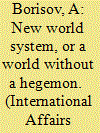

|
|
|
| 10 |
ID:
195763


|
|
|
|
|
| Summary/Abstract |
Over the last decade, Graham Allison's ‘Thucydides trap’ has become a predominant framework for analysing the prospect of great power conflict between the United States and China. The controversy surrounding this rise to prominence has reinvigorated a tradition of thinking about the effects of power parity on global order that previously flourished during the Cold War. This renewed attention has nevertheless come at a significant cost. By reconstructing the tradition from which the Thucydides trap emerges, a tradition that we call rise-and-fall theory, this article demonstrates how the ascendance of the Thucydides trap as a framework of analysis has obscured critical debates about the relationship between the rise and fall of competing powers and the onset of conflict. These debates problematize fundamental questions concerning how to conceptualize power, what types of interstate relations are to be analysed, and which causal mechanism(s) matter most in explaining revisionism and conflict. This article demonstrates how the Thucydides trap largely overlooks these debates, thereby providing analysts with less precise heuristics for thinking about the prospect of global conflict than they might otherwise have. We develop a more pluralistic approach to the application of rise-and-fall theory that makes use of its diverse perspectives and substantive divergences to provide more nuanced and holistic analyses.
|
|
|
|
|
|
|
|
|
|
|
|
|
|
|
|
| 11 |
ID:
193535
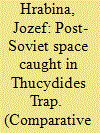

|
|
|
|
|
| Summary/Abstract |
Witnessing the pro-Western shifts in the post-Soviet countries, Russia has failed to develop policies that would attract the former Soviet satellites without keeping them in its sphere of influence via hard-power. On the other hand, Western values, political influence and institutions have penetrated Eurasian countries causing Russia’s relative decline. This structural dynamic not only entraps Russia in a zero-sum game with the West but also triggers Russian threat perceptions on the unit level. Russian strategic culture emphasizes anxieties about loss of sovereignty or power shifts in the Russian regime that could mean the end of the current establishment, border security, and great power status resurrection. A combination of these threat perceptions and structural shifts manifests in the Thucydides Trap, an ancient dilemma behind the preventive war, in the post-Soviet space.
|
|
|
|
|
|
|
|
|
|
|
|
|
|
|
|
| 12 |
ID:
180464
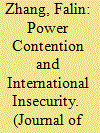

|
|
|
|
|
| Summary/Abstract |
The China–US financial contention or confrontation comes to the fore, given the pivotal role of finance in the international system and the current international order transition. Will there be destructive conflicts or a Thucydides Trap in China–US financial relations? By adopting a power analysis framework, the China–US financial contention is observed from four types of international financial power: structural, relational, institutional and ideational. The competition for these powers results in reform divergence of global financial governance and thus international financial insecurity. The contention and consequent insecurity, however, do not necessarily mean an inevitable ‘Thucydides Trap’ in China–US financial relations. Elaborated and issue-specific ways of management could alleviate the contention, including shunning RMB-USD strategic confrontation, refraining from a debt weapon and aggressive imbalance adjustment, enhancing the legitimacy of international financial institutions and avoiding a new Cold War.
|
|
|
|
|
|
|
|
|
|
|
|
|
|
|
|
| 13 |
ID:
171889
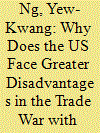

|
|
|
|
|
| Summary/Abstract |
The rhetoric used by President Trump regarding the trade war against China is rife with misinterpretation. The actual American trade decit with China is much lower if evaluated in the correct terms of value-added. The decit is mainly a result of insufcient domestic US savings. In addition, as the US dollar is an international currency which is being increasingly held as a result of increases in world population, income, prices and transaction intensity, Americans can benet from having trade decits of hundreds of billions of US dollars each year. My analysis, as well as a model of the Bank of England, reveals that the trade war is not only mutually harmful but also actually hurts America more than China. The Thucydides Trap is likely avoidable in the current nuclear era of assured mutual destruction and because China, facing many structural impediments, is still far behind America in technology and military power.
|
|
|
|
|
|
|
|
|
|
|
|
|
|
|
|
|
|
|
|
|